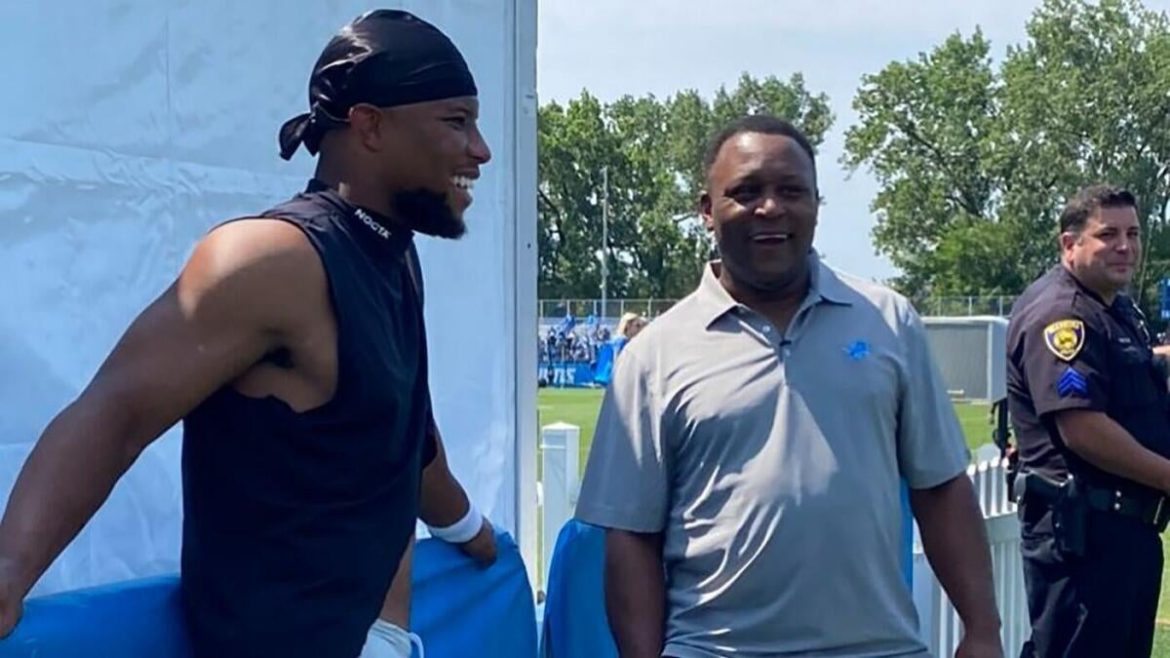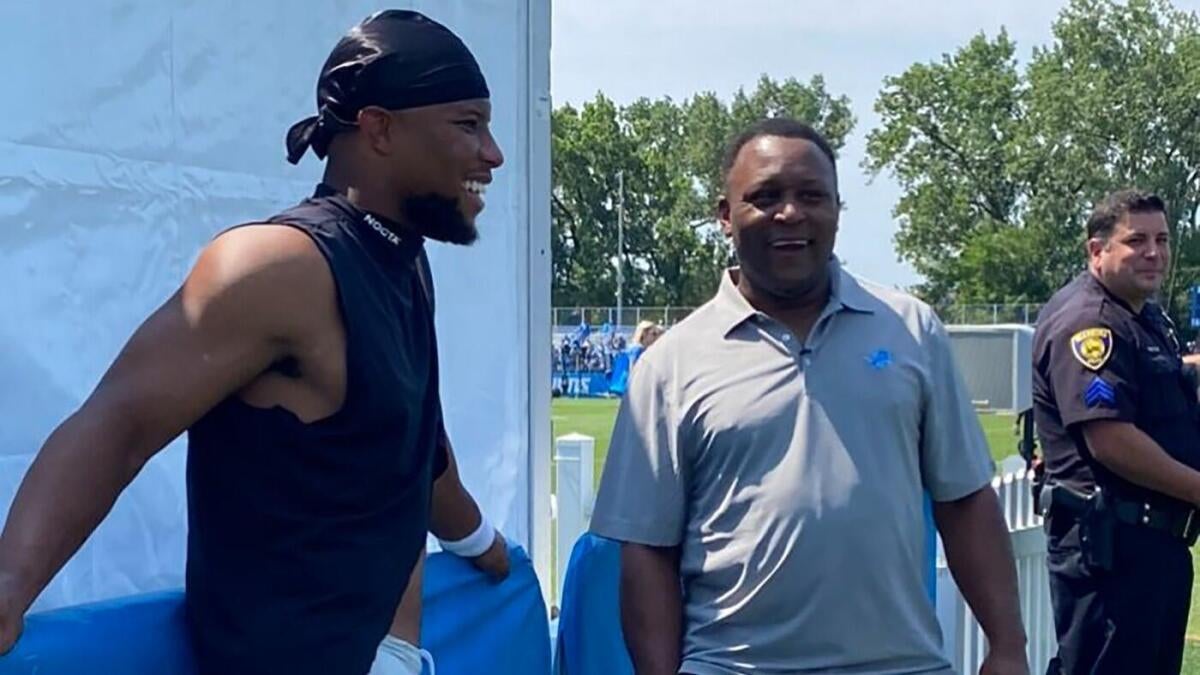Saquon Barkley and the Barry Sanders Parallel: An In-Depth Exploration of a Surprising NFL Retirement Narrative
—
Introduction: A Star Running Back’s Unexpected Contemplation
Saquon Barkley, the Philadelphia Eagles’ standout running back and one of the NFL’s brightest talents, has recently captured widespread attention—not just for his on-field exploits, but for his candid remarks hinting at a potentially abrupt retirement. Barkley has drawn a striking comparison between his own career trajectory and that of Hall of Famer Barry Sanders, suggesting that, much like Sanders, he might choose to retire suddenly, “out of nowhere,” and perhaps even while still performing at a high level. This notion has caused a notable stir among Eagles fans, analysts, and the broader NFL community, prompting both reflection on Barkley’s career and discussion about athlete longevity and legacy in professional football.
—
Barkley’s Comments: Channeling Barry Sanders
Saquon Barkley recently appeared on a podcast where he expressed that his retirement might come as a surprise. He explicitly mentioned Barry Sanders, his favorite player and a legendary figure in NFL history, who famously retired abruptly in 1998 after a prolific career. Barkley explained, “I’ll probably just wake up one day, whether it’s next year or two years or four years, and just be like, ‘Yeah, it’s over.’”
This striking candor serves two purposes: it reflects Barkley’s admiration for Sanders’ decision and career, and it sends a message that even at the peak of his career, players can make deeply personal decisions about their futures that may defy public expectations. Unlike many athletes who announce retirement plans well in advance, Sanders’ decision shocked the NFL world because it was sudden and occurred when he was still performing inside the top tier of the league.
—
Barry Sanders’ Legacy and Influence on Barkley
Barry Sanders’ influence on Barkley transcends mere athletic capability. Known not only for his unmatchable agility and elusive running style but also for his emphasis on personal well-being and passion for the game, Sanders’ departure is a profound example of an athlete choosing to exit on their terms. Sanders retired at age 31 despite being in his prime, citing a loss of passion as a key factor.
Barkley, who recently signed a two-year contract extension reportedly worth $41.2 million, including $36 million guaranteed, remains at the height of his career after winning a Super Bowl and setting NFL records. Yet, his statements suggest that, like Sanders, passion and personal fulfillment might ultimately take precedence over the longevity of his playing days.
Barry Sanders has publicly praised Barkley, commending him for revitalizing the value of the running back position in an era when it had been somewhat devalued. Sanders has highlighted Barkley’s dynamic running and ability to avoid unnecessary hits as factors that could help prolong his career compared to others in the past who endured heavy wear and tear. Sanders has also predicted that Barkley could rank amongst the all-time greats, even potentially joining or supplanting some of the names on the proverbial RB “Mount Rushmore.”
—
The NFL Running Back Context: Durability and Valuation
The running back position has endured dramatic shifts in the NFL’s landscape in recent years. The league trend has leaned toward passing offenses, heavy rotation of running backs, and shorter peak windows due to the physical demands of the position. This means the career span of a top-tier running back like Barkley is under intense scrutiny.
Barkley’s career so far evidences both his tremendous talent and the challenges of navigating injuries and workload management. Analysts have noted that Barkley’s style, much like Sanders’, involves elusiveness and agility rather than absorbing constant hits, which could contribute to a relatively longer playing career. Nevertheless, the physical toll of professional football remains relentless.
His surprise retirement hint thus taps into a broader discourse about player health, career fulfillment, and the changing economics of the position. Barkley’s signing as the first NFL running back to earn upwards of $20 million annually highlights his exceptional status but also underscores ongoing discussions about the long-term sustainability and value of running backs in the league’s evolving business model.
—
Eagles’ Response and Fan Reaction
Philadelphia Eagles head coach Nick Sirianni addressed Barkley’s retirement comments with cautious optimism, emphasizing that Barkley “has a lot of football left” and that the team is focused on maximizing his talents in pursuit of another Super Bowl. Sirianni’s remarks reflect a common stance among player-supportive staff: attentive to personal player insight but hopeful that star athletes will continue contributing for the team’s sake.
For Eagles fans, Barkley’s retirement talk is a source of understandable anxiety. His presence has been instrumental to Philadelphia’s offensive successes, and speculation about an early exit raises questions on how the team will navigate future roster building and strategy without one of the NFL’s most dominant backs.
However, Barkley himself has reassured supporters that he remains committed to the game and his teammates. His statements have been interpreted more as a reflection on the unpredictable nature of athletic careers, rather than an immediate retirement forecast.
—
Barkley’s Career Achievements and Future Potential
Saquon Barkley’s career achievements have solidified his standing as one of the premier running backs of his generation. His statistical feats include setting an all-time NFL single-season rushing yards record combining regular season and playoffs (2,504 yards), earning multiple Pro Bowl selections, and securing a Super Bowl championship.
At 28 years old, entering what is often referred to as a player’s “prime,” Barkley projects to continue delivering elite performances. His recent contract extension through 2028 suggests both the Eagles’ belief in his ongoing value and the league’s recognition of his market impact on the running back position.
Barkley’s legacy, however, will likely be shaped as much by his holistic approach—balancing passion, health, and personal timing of career decisions—as by the numbers he racks up on the field.
—
Conclusion: The Intersection of Passion, Legacy, and Sudden Decisions
Saquon Barkley’s candid reflections on potentially retiring suddenly like Barry Sanders open a fascinating window into the mindset of elite athletes confronting the grueling realities of professional sports careers. In expressing a willingness to walk away unexpectedly, Barkley aligns himself with a celebrated NFL icon who prioritized personal fulfillment and timing over external pressures.
This narrative challenges the conventional athlete retirement script, encourages fans and organizations to appreciate the personal dimensions of players’ careers, and adds a compelling chapter to the ongoing saga of how football stars define their own legacies. Whether Barkley eventually follows in Sanders’ footsteps remains to be seen, but his openness has already sparked meaningful conversation about the evolving relationship between performance, passion, and professional lifespan in the NFL.





